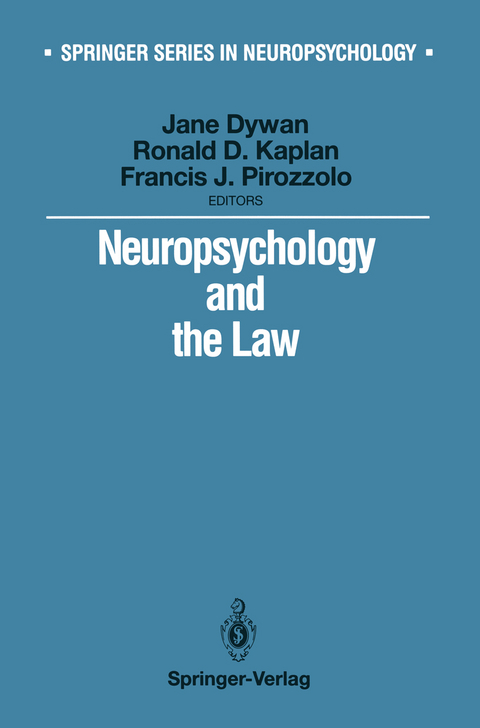
Neuropsychology and the Law
Springer-Verlag New York Inc.
978-1-4612-7798-9 (ISBN)
1 Neuropsychology and Its Applications to the Legal Forum.- Mental Illness Versus Incompetency.- Competence Versus Responsibility.- The Scientific Basis of Neuropsychology.- The Nature of Science and the Needs of the Court.- The Psychometric Methods of Neuropsychology.- The Neuropsychological Assessment.- Summary and Conclusions.- 2 Minor Head Injury and the Post-Concussive Syndrome.- The Importance of Interviewing Collaterals.- Some Special Considerations Regarding Assessment of Children.- Frontal Lobe Tests.- Anosmia and Parosmia.- Dichotic Listening.- The Minnesota Multiphasic Personality Inventory.- Psychodiagnostic Assessment.- Conclusion.- End Notes.- 3 Workers’ Compensation and Clinical Neuropsychological Assessment.- Workers’ Compensation and Neuropsychological Information.- Role of Clinical Neuropsychology in Workers’ Compensation.- 4 Assessing the Neuropsychological Abilities of Children and Adolescents for Personal Injury Litigation.- Neuropsychologists and Personal Injury Litigation.- Existence of Neuropsychological Impairments.- Consequences of Neuropsychological Impairments.- Causes of Neuropsychological Impairments.- Issues Unique to Children.- Conclusion.- 5 The Assessment of Competency in the Older Adult.- Normal Aging.- Diseases and Disorders.- Assessment.- Summary and Conclusions.- 6 Legal Applications of Electrophysiological Assessments.- Quantitative Measures of Brain Function.- Assessment Needs in Litigation Proceedings.- Further Applications for Electrophysiological Data.- Obstacles and Precautions in the Use of Electrophysiological Data.- Summary and Conclusions.- 7 The Use of Neuroimaging Techniques in Brain Injury.- Techniques.- Regional Brain Function and Behavior.- A Method for Integrating Behavioral and Neuroimaging Data.- PresentLimitations and Future Steps.- Implications for Legal Practices.- Conclusions.- 8 The Problems of Prognpsis.- Epidemiology of Brain Trauma.- The Relevance of the Animal Literature.- Neural Responses to Injury.- Mechanisms Associated with Neurological Recovery.- The Problem of Localization.- Focal Versus Diffuse Effects.- Variables Affecting Recovery.- Situations in which Further Deterioration can be Expected.- Prognostic Strategy.- 9 Can Competencies be Retrained? A Critical Appraisal of Cognitive Rehabilitation.- Cognitive Competency.- Cognitive Incompetency and Rehabilitation.- Contextual Considerations.- Evaluating Cognitive Rehabilitation: General Issues.- Can Cognitive Competencies be Retrained?.- Rehabilitation and Psychosocial Problems.- Overall Effectiveness of Cognitive Rehabilitation.- Conclusions.- 10 Developing Legislation and the Concept of Disability.- Outdated Concepts and Their Implications: The Case of No Fault Automobile Insurance in Ontario.- The Tort System with No Fault Add On in Ontario.- History of the Debate on Automobile Insurance in Ontario.- The Disability Assessment Model 268 From the Rehab Setting to the Neuropsychological/Legal Evaluation.- Author Index.
| Reihe/Serie | Springer Series in Neuropsychology |
|---|---|
| Zusatzinfo | XVI, 295 p. |
| Verlagsort | New York, NY |
| Sprache | englisch |
| Maße | 155 x 235 mm |
| Themenwelt | Geisteswissenschaften ► Psychologie |
| Studium ► 2. Studienabschnitt (Klinik) ► Rechtsmedizin | |
| ISBN-10 | 1-4612-7798-1 / 1461277981 |
| ISBN-13 | 978-1-4612-7798-9 / 9781461277989 |
| Zustand | Neuware |
| Haben Sie eine Frage zum Produkt? |
aus dem Bereich


